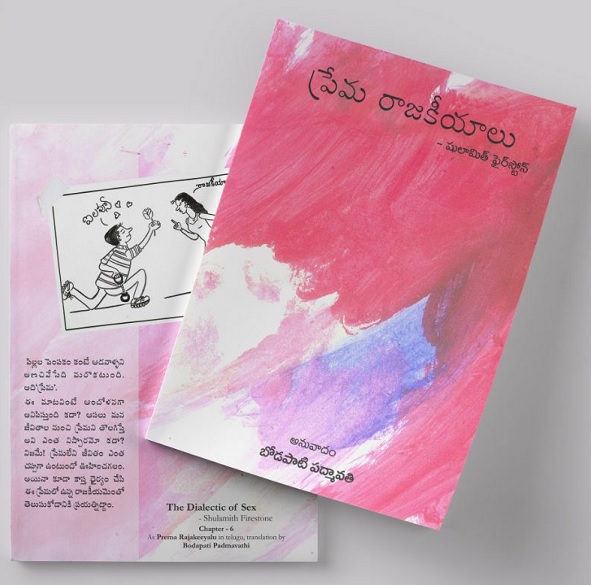
రెండవ దశ స్త్రీవాద ఉద్యమ ప్రభంజన వేళ షులామిత్ ఫైర్స్టోన్ రాసిన ‘ద డయాలెక్టిక్ ఆఫ్ సెక్స్’ అనే సంచలనాత్మక గ్రంథంలోని ‘ప్రేమ’ అనే అధ్యాయానికి అనువాదం ఈ చిన్ని పొత్తం. 1970లో వెలువడిన ఈ పుస్తకంలోని ఈ అధ్యాయం ఇప్పుడెందుకు చదవాలి మనం? అనే ప్రశ్నకు నా దగ్గర రెండు జవాబులున్నాయి. స్త్రీల చైతన్యాన్ని గురించి ఆలోచించే వాళ్ళందరూ ఆ చైతన్యం ఎలా మొలకెత్తి ఊపందుకున్నదీ, ఎంతవరకు ప్రయాణించిందీ తెలుసుకునే సందర్భంగా ఆయా దశల్లో వెలువడి, ఆలోచనలకు పదును పెట్టిన పుస్తకాలను చదవాలి. అవి ఇప్పుడు ప్రాసంగికమా కాదా అనేది పక్కనపెట్టి, ఆ ఆరోహణ క్రమాన్ని అధ్యయనం చేసి ఇప్పటి పరిస్థితుల్లో ఆయా రచనలను ఎట్లా అర్థం చేసుకోవాలో ఆలోచించాలి. రెండవది ఈ అధ్యాయంలో ఆమె చెప్పిన విషయాలు పూర్తిగా కొట్టిపారేసేటంతగా పరిస్థితులు మారకపోవడం. స్త్రీ పురుషులెవరికైనా ప్రేమంటే ప్రేమే కదా? అనుకోడానికి ఎలా వీలు కాదో షులామిత్ విశ్లేషిస్తుంది. స్త్రీ పురుషులిద్దరూ సమానులే అనుకున్నప్పుడు, పురుషులు కొంచెం ఎక్కువ ఎందుకు సమానులయ్యారో రెండవ దశ స్త్రీవాదులందరూ విశ్లేషించారు. ఈమె రాడికల్ ఫెమినిస్ట్ కనుక ఇంకొంచెం తీవ్రంగా విశ్లేషించింది.
స్త్రీని కుటుంబ బంధనాల్లో ఇరికించి ఆమెను కట్టడి చేసేది కేవలం సంతానాన్ని కని పెంచడం అనే విషయమే కాదనీ, అంతకన్నా ముఖ్యమైనదీ ఆ చక్రానికి ఇరుసు వంటిదీ ప్రేమ అనీ, ఆ ప్రేమ అనేది ఎలా రాజకీయం అయిందో వివరిస్తుంది రచయిత్రి. ప్రేమ అనేది భూమిలో నుంచి ఎగదన్నుకు వచ్చే జలధారలా హృదయం నుంచి చిమ్ముకు వస్తుందనుకుంటాం. కానీ దాని వెనక కూడా రాజకీయం ముడిపడి ఉందనుకుంటే జడుసుకుంటాం. ఆ జడుసుకోక తప్పని విషయాలేమిటో, అవి కొన్ని ఇప్పటికి కూడా మారకుండా ఎట్లా, ఎవరు నిలబెడుతున్నారో అర్థమవుతుంది. మొదట్నుంచీ స్త్రీకి కొన్ని ఆదర్శాలు నిర్దేశించబడ్డాయి. ఆమెను ప్రేమమయిగా, త్యాగమయిగా, మాతృమూర్తిగా అభివర్ణిస్తూ వచ్చారు. ఆమె కూడా ఆ వర్ణనకి అనుగుణంగా రూపం దాలుస్తూ వచ్చింది. అట్లా లేని స్త్రీని ఇవ్వాళ్టివరకూ జనసామాన్యం ‘నువ్వు ఆడదానివేనా?’ అనడం వింటూనే ఉంటాం. ఆ మూసలో ఒదిగిపోయి మంచి పేరు తెచ్చుకోడానికి ఆమె చేసే కృషి కొనసాగుతూనే ఉంది. అదట్లా ఉంచి, స్త్రీ పురుషుడిని ప్రేమించే విధంలోనూ, పురుషుడు స్త్రీని ప్రేమించే విధంలోనూ ఉన్న అంతరాన్ని షులామిత్ అద్భుతంగా ఆవిష్కరించింది. పురుషుడు అన్నింట్లోనూ తన ఆధిక్యాన్ని వ్యక్తపరుస్తాడు. స్త్రీ తన అభద్రతను, తనను గుర్తించాలనే ఆరాటాన్నీ ప్రేమ రూపంలో ప్రదర్శిస్తుంది. అనేక రకాలుగా ప్రయత్నిస్తుంది. ఇద్దరు సమానస్థాయి వ్యక్తుల మధ్య ఈ ఆరాటానికి, ఆధిక్య భావప్రకటనకీ తావుండదు. కానీ ఆ సమానత్వ సంస్కృతి లేనిదే స్వచ్ఛమైన ప్రేమకి ఆస్కారం ఉండదు. ఇది షులామిత్ విశ్లేషణలో ఒక అంశం. ప్రేమలు ఎట్లా ఉండకూడదో అర్థమవుతుంది షులామిత్ రాసిన ప్రేమ అనే అధ్యాయం చదివినప్పుడు. దీనిని పద్మావతి ఆసక్తికరంగా చేసిన ఈ అనువాదం ఆలోచింపజేస్తుంది.
‘స్త్రీ పురుషులిద్దరూ ఒకరినొకరు స్వతంత్ర వ్యక్తులుగా గుర్తించాలి. ఇందువలన పరస్పర సహకారం, స్నేహం పెరుగుతాయి. అలాగే, కాంక్ష, ప్రేమా, కలలు, సాహసాలు వాటి అర్థాలను కోల్పోవు. అలాగే మానవజాతిలోని సగానికున్న బానిసత్వాన్ని, తద్వారా నెలకొన్న ద్వంద్వనీతినీ నిర్మూలించినప్పుడు మానవజంటల నిజమైన రూపాన్ని మనం దర్శించగలం. సూటిౖయెన సహజమైన సంబంధం కావాలి’ అని ఏడు దశాబ్దాల క్రితమే అంటుంది సిమోన్ ద బావా.
ఇటువంటి మానవ సంబంధమే ప్రేమ. మన సంస్కృతిలో అది ఉందా? లేకపోతే ఎన్నాళ్లు ఎదురుచూడాలి?
(‘ద డయాలెక్టిక్ ఆఫ్ సెక్స్’ పుస్తకంలోని ‘ప్రేమ’ అనే చాప్టర్ను బోడపాటి పద్మావతి గారు తెలుగులోకి ‘ప్రేమ రాజకీయాలు’ పేరుతో అనువాదం చేసారు. ఈ పుస్తకానికి పి.సత్యవతి గారు రాసిన ముందుమాట ఇది.)
ప్రతులకు:
ధీర పబ్లికేషన్స్ – 9985427121

పద్మావతిగారి అనువాదం సరళంగా, సూటిగా ఉంది.
As Geoff Dyer, famously wrote “when it comes to regret, everyone’s a winner”
Firestone’s original used to be a hotly debated book twenty years ago, when marxist literary analysis was being questioned for some of its limitations.
These questions are now posed and enquired in a much wider and broader philosophical, social and even economic contexts. I recommend the following:
1. The Economization of Life by Michelle Murphy.
Murphy is a feminist technoscience studies scholar. She explicitly states that her purpose is to provoke and not prove. Her charge is that the entire apparatus of economics and econometrics is a racist attempt to control the population of poor countries and rob women in those countries of their reproductive rights. In this sense, she goes beyond the well established “battle of the sexes” and male domination, and poses some larger questions – the individual’s sacrifices for the good of “state”.
2. Better Never to Have Been: The Harm of Coming into Existence by David Benatar
Benatar is a provocative philosopher – he asks questions that we normally never do. He argues that it is better not to be born at all, and raises questions about why “parenthood” is held so sacred in all cultures.
Here is the editorial blurb from Amazon about this book: “Are our lives meaningful, or meaningless? Is our inevitable death a bad thing? Would immortality be an improvement? Would it be better, all things considered, to hasten our deaths by suicide? Many people ask these big questions — and some people are plagued by them. Surprisingly, analytic philosophers have said relatively little about these important questions about the meaning of life. When they have tackled the big questions, they have tended, like popular writers, to offer comforting, optimistic answers. The Human Predicament invites readers to take a clear-eyed and unfettered view of the human condition.
3. Selfish, Shallow and Self-Absorbed by Meghan Daum
This book is a collection of 12 essays by eminent feminist writers, all of them have chosen not to have children. This collection makes a smart and passionate case for why parenthood is not the only path to a happy, productive life and takes our parent centric, kid fixated, baby bump patrolling culture to task in the process. In this book, that shadowy faction known as the childless by choice comes out into the light.
I would really love to see this book translated into Telugu – it is time, we ask some tough questions.
btw, ధీర సంస్కృత పుల్లింగ శబ్దం
పిల్లల పెంపకం అనేది ఒక అణచివేత అనుకోవడం తప్పు. స్వేచ్చ, ప్రతిఫలం వంటి విషయాలలో నస్టపోయిన వారి బలహీనమైన ఆక్రందన అది. అలాగే ప్రేమ అనేది ఒక భావన. జీవితంలో ప్రేమ లేకుంటే నిస్సారం కాదు. ఎలాగంటే మనం చీకటిలో వుండాల్సినప్పుడు భయం అనే భావన కలుగుతుంది. వెలుతురు రాగానే ఆ భావన పోతుంది అలాగే.